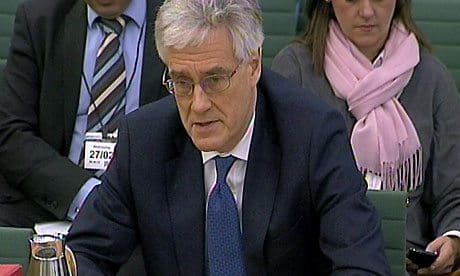Lord Turner, chairman of the Financial Services Authority, has hit out against the “computer game” mentality of the trading floor as he revealed the regulator’s internal report into Libor rigging could highlight the need for more whistleblowers.
In evidence at the banking standards commission on Wednesday, Turner added that new banks will be permitted to hold capital cushions of less than half the size of existing players in an effort to bolster competition in a sector dominated by the four big banks. Turner said new banks would only need capital ratios of 4.5% compared with the 10% required for existing banks, providing clues to a paper due to be published in the coming weeks on getting more new banks created, reports The Guardian.
This would be in stark contrast to the current regime which had demanded new banks hold even more capital than established banks. Turner, who leaves his role at the end of March when the FSA is disbanded, disclosed that the FSA’s internal report into Libor fixing had found the manipulation would not have been uncovered if the regulator had not been investigating the “low balling” of Libor submissions during the 2008 crisis. Libor is set by a panel of banks asked the price at which they would expect to borrow money from each other. During the crisis some banks made low submissions to avoid any impression they were in financial difficulty.
“There was no information on the trader manipulation,” said Turner. “I’m simply saying it has made me think how would you do that where something is difficult to spot … In a sense, is whistleblowing one of the few mechanisms that would have worked?”.
Turner said the trading floor culture allowed traders to “say anything I do that makes a profit is valuable” and produced a “moral universe that this is just a computer game”. He also expressed concern about a plan in Brussels to cap bonuses, which could lead to higher salaries and make it harder to claw back bonuses. He made the remarks as he and Martin Wheatley, who runs the new Financial Conduct Authority – charged with protecting consumers from misbehaviour by financial services companies – were urged to “get a grip” on the payment protection insurance scandal which has cost the banking industry more than £10bn.
Turner, who will leave at the end of March when the FSA will be disbanded, admitted the regulator should have been faster in stopping payment protection insurance sales. Lord Turnbull, a member of the banking standards commission, told Turner and Wheatley to “bring some order” to the deluge of PPI claims that has seen banks pay out more than £12bn in compensation. Wheatley conceded it was “chaos in the sense that volumes [of claims] are huge” but insisted that the cost to the industry should be put in the context of £50bn of sales made. He said that the FSA had not realised that between 2005 and 2008 sales of PPI were “the vast majority of the [bank’s] retail profits.”
“We didn’t realise how much money was being taken out of consumers’ pockets,” he added. In future the new FCA, which formally begins life in April when the FSA will be disbanded, will “look at where the money goes” to try to avoid a repeat of the PPI scandal, he said. PPI misselling was one of the main reasons why the FCA is being given powers to ban products before they are launched.
In the past, said Turner “there was a philosophical tendency to say it’s not for us to immediately completely enforce new rules” on a product. In a “perfect world” the FSA would have acted on PPI within a year of its creation in 2001. It took until 2011 for large-scale claims to begin to pay out when Lloyds Banking Group pulled out of a judical review by the industry over the way claims for PPI misselling were handled. Wheatley hit out against the former boss of Lloyds, Eric Daniels, who had told the commission he felt the bank was “on the side of the angels”. Turner said this was “quite extraordinary” and that Daniels “seemed to think running his bank was almost akin to running a supermarket”.


